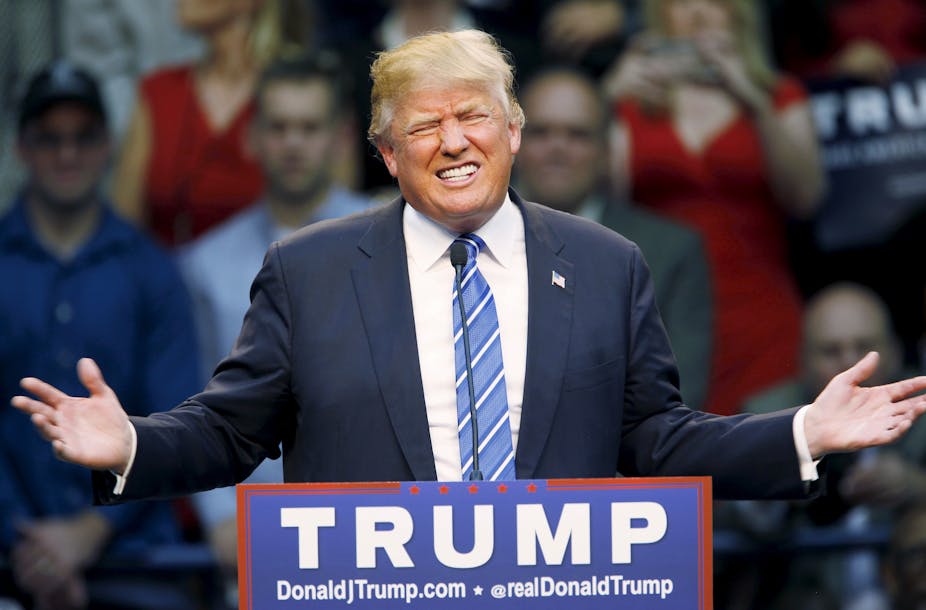Donald Trump holds a commanding lead in Republican presidential polls. The most recent CNN poll shows Trump with a 20-point lead over his GOP challengers.
The CNN poll is not an aberration. The Quinnipiac, Fox News and Washington Post polls also show Trump with a double-digit lead.
But Trump is in last place when it comes to a crucial measure of presidential viability: endorsements by major officeholders. Thus far, no incumbent governor or current member of Congress has endorsed the New York billionaire.
To be sure, Trump seems much more interested in poll results than political endorsements. At a recent campaign rally he boasted that he was “killing everybody” in both national and state polls.
However, a growing body of evidence from recent elections shows that polls are an increasingly unreliable measure of public opinion. Instead, candidate endorsements offer a more accurate forecast of election outcomes, a fact that is bad news for Trump but good news for Hillary Clinton.
Unreliable polls
Despite the media’s obsessive coverage of polling data, history shows that polls have a bad track record of predicting election outcomes. For example, the polls predicted that Howard Dean would win the Democratic nomination in 2004, Rudy Giuliani would win the Republican nomination in 2008 and Newt Gingrich would win the GOP nomination in 2012.
But the polls were wrong. None of those candidates caught fire with the voters and each dropped out long before the party conventions.
The problem of flawed polling data is only getting worse. Statisticians warn that the rise of cellphones and the sharp decline in participation rates have rendered polls so unreliable that the fate of the polling industry itself is now in doubt.
The key to the White House
A more dependable measure of a candidate’s strength is found in endorsements by political officeholders, prominent interest groups and major newspapers. Indeed, endorsements have a surprisingly accurate track record of forecasting presidential elections.
For example, a 2012 study by the American Presidency Project found that Barack Obama was endorsed by more major newspapers than Mitt Romney, an overlooked metric that accurately reflected the election’s ultimate outcome. The accuracy of the 2012 newspaper endorsements was not a fluke. A 2011 study by Editor & Publisher magazine found that between 1972 and 2008, the candidate that garnered the most endorsements from large-circulation newspapers won the presidency in seven out of 10 elections.
Political endorsements provide an even more accurate election forecast. For example, a 2008 study by the political scientists Marty Cohen, David Karol, Hans Noel and John Zaller found that endorsements by state and federal officeholders and key interest groups served as a powerful predictor of which candidates ultimately won their parties’ nominations.
Clinton monopolizing Democratic endorsements

The critical importance of political endorsements is not lost on Hillary Clinton.
When it comes to receiving the public support of influential party leaders, no candidate even comes close to her. Clinton has thus far received 192 endorsements by governors and members of Congress, while Bernie Sanders has received only two endorsements and Martin O’Malley has just one.
Also noteworthy is the fact that Clinton recently received the endorsements of major labor unions, a key Democratic Party constituency.
If history is any guide, Clinton may have already effectively won the Democratic nomination by dominating the endorsement race.
GOP endorsement race still undecided
In contrast, the hunt for Republican endorsements has barely even begun. The overwhelming majority of GOP governors, senators and representatives have thus far not endorsed any of the presidential candidates.
But recent trends indicate that Ted Cruz and Marco Rubio are beginning to build some endorsement momentum. In November, Cruz won the critical endorsement of Steve King, an arch-conservative congressman with enormous influence among Iowa caucus voters. Since receiving King’s endorsement, Cruz has moved into the top two in the latest Iowa polls. Meanwhile, Rubio has received 18 endorsements since September, more than any other Republican candidate this fall.
And last month the Union Leader, an influential conservative newspaper in New Hampshire, endorsed Chris Christie. Although the Union Leader has not always correctly predicted the winner of the New Hampshire primary, the candidate receiving the newspaper’s endorsement has usually experienced a significant boost at the ballot box on primary day.
Will Republican leaders endorse Trump?
By mid-December, Trump had received only one important endorsement - from the New England Police Benevolent Association.
That’s not surprising. After all, Trump has based his campaign on exploiting the intense anti-establishment mood among rank-and-file Republicans by making false, outrageous, bigoted and divisive statements that appall the GOP leadership.
He has also made clear his disdain for party leaders. In an ABC interview last month Trump declared: “I’m leading because people are sick and tired of stupid and incompetent people leading our nation.”
But to win a presidential election, you need a nationwide organization to mobilize voters. Mitt Romney learned that fact the hard way in 2012. The Obama campaign’s get-out-the-vote efforts far surpassed those of the Romney campaign, an organizational advantage that proved decisive on election day.
That is why endorsements are so important. They demonstrate that a candidate has built the campaign infrastructure necessary to win a national election.
Party leaders are key to the success of such organizational efforts. At some point, therefore, Trump must start wooing Republican governors, senators and representatives. Although an anti-establishment mood grips the GOP, the party’s organizational leadership is critical to get-out-the-vote efforts on election day.
Thus, despite the media’s intense focus on polling data, endorsements remain indispensable to successful presidential campaigns. Trump ignores that fact at his peril.
Editor’s note: This article was updated on Dec. 11, 2015 to report Trump’s first major endorsement.

